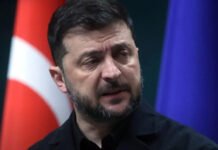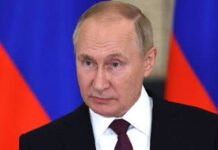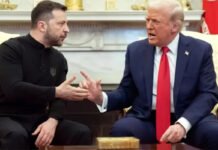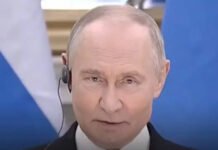INVC NEWS
Moscow – : Russian President Vladimir Putin has assured full support to Iran following a high-level meeting with Iranian Foreign Minister Abbas Araghchi in Moscow, intensifying speculation about the growing alignment between the two nations amid rising tensions in the Middle East.
The strategic dialogue took place at the Kremlin, where both sides reportedly discussed defense cooperation, nuclear developments, and the escalating confrontation with the United States. The meeting marks a significant step in geopolitical realignment as Iran and Russia strengthen their alliance amid global uncertainty.
Iran-Russia Alliance Signals Shift in Global Power Balance
President Putin’s assurance comes at a time when U.S.–Iran tensions have reached critical levels, following a series of U.S. airstrikes on Iranian nuclear facilities. With Iran already under immense international pressure over its alleged nuclear activities, Russia’s pledge of support could shift the dynamic of the ongoing conflict.
According to Russian officials, the partnership will include expanded military cooperation, intelligence sharing, and economic coordination. While details remain classified, the move signals a clear warning to Western powers about the formation of a new strategic bloc.
United States Still Pursuing Hidden Uranium Sites
The United States remains committed to uncovering undeclared uranium stockpiles believed to be hidden by Iran, citing violations of IAEA agreements. Washington has intensified satellite surveillance and intelligence operations to monitor any secret developments at suspected Iranian nuclear sites.
The U.S. intelligence community is particularly focused on underground facilities near Natanz and Fordow, which may still house enriched uranium exceeding the limits agreed upon under the defunct JCPOA (Joint Comprehensive Plan of Action).
Putin’s Statement: “We Stand By Iran”
Following the meeting, Putin publicly affirmed Moscow’s commitment to Tehran, calling Iran a “key regional partner” and stressing the importance of resisting Western interference in sovereign affairs.
“We are fully committed to supporting Iran in maintaining its sovereignty, pursuing peace in the region, and resisting unlawful aggression,” Putin reportedly stated.
This pledge raises concerns in Western capitals, where analysts believe a direct Russia-Iran military alliance could dramatically escalate the Israel-Iran-U.S. conflict.
Regional Fallout: Middle East on Edge
The Iran-Russia alignment comes amid increasing volatility in the region. Israel continues its strikes on Iranian infrastructure, and Iran has retaliated with missile attacks, some of which have reportedly hit civilian targets in Tel Aviv.
Now, with Russia entering the picture more directly, the possibility of a wider regional war cannot be ruled out. Middle East observers fear the emergence of a dual-front challenge to U.S. influence, from both Moscow and Tehran.
Iran Seeks Strategic Depth Amid Sanctions
Iranian diplomats have made no secret of their desire to deepen ties with Russia, especially as sanctions cripple Iran’s economy. The partnership offers Tehran a powerful counterweight to U.S. sanctions and access to advanced defense systems such as the S-400 missile platform.
This cooperation may also extend into cybersecurity, drone warfare, and artificial intelligence-based surveillance systems, offering Iran a technological edge in modern conflict scenarios.
Implications for Global Energy Markets
As tensions rise, the potential impact on global oil and gas markets is significant. Both Iran and Russia are major energy suppliers, and their alignment could lead to joint decisions affecting production or distribution, especially in response to Western sanctions or military escalations.
Market analysts have already flagged concerns about possible disruptions in Strait of Hormuz shipping lanes, a chokepoint for nearly 20% of global oil supply.
IAEA and UN Watch Closely
The International Atomic Energy Agency (IAEA) is reportedly monitoring the situation closely, as Iran refuses full transparency about its nuclear sites. The United Nations has called for restraint, urging all parties to return to diplomatic channels.
However, with Iran digging in and Russia now actively involved, the chances of peaceful resolution seem increasingly remote.
What Comes Next?
As of now, two global powers — Iran and Russia — are inching toward a unified front against the U.S. and its allies. With the search for hidden uranium ongoing and open military cooperation under discussion, the coming weeks could determine whether this remains a cold alliance or develops into a full-scale wartime coalition.
The world watches as power shifts in real time, and alliances once thought impossible begin to shape a new order in global politics and warfare.
















